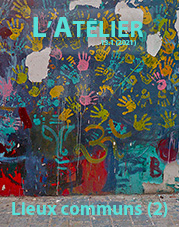The “room of one's own” in Virginia Woolf and Jean Rhys: looking for a “common ground”
Abstract
So many things seem to oppose Virginia Woolf and her contemporary Jean Rhys, as critics have amply stressed, despite some rare exceptions. Nevertheless, this article offers to explore a literary and political “common ground”, by reading the treatment each of these authors makes of the “room of one’s own” claimed by the title of Woolf’s famous essay, in their interwar fiction. Their “common ground” does not lie so much in the subjective or bodily occupation of a “room” by the characters, as in the perpetual absence of such a place. In their different though comparable ways, Rhys’s and Woolf’s “room of one’s own” remains constantly out of reach, whether it evades any form of emotional or subjective adoption by the characters, or whether the characters themselves eschew such a sense of belonging or ownership. “Space” then takes over, rather than the stability of place, according to the meaning Marie-Claire Ropars-Wuilleumier gives it in Écrire l’espace. What lies there, this article argues, is a common ethical and critical “ground”, based on Woolf’s and Rhys’s chosen marginal postures and refusals to belong, on the threshold of this forever non-existent “room of one’s own” which, in turn, becomes the place, or rather “non-place”, of an imaginary and evanescent dialogue between them.
Keywords : place, space, city, Virginia Woolf, Jean Rhys, belonging, appropriation, subjectivity, room, threshold, A Room of One’s Own
Downloads
Published
Issue
Section
License
- Work submitted for publication must be original, previously unpublished, and not under consideration for publication elsewhere. If previously published figures, tables, or parts of text are to be included, the copyright-holder's permission must have been obtained prior to submission.
- Authors of accepted manuscripts will assign to L'Atelier the right to electronically distribute their article, or publish it in any form (Internet, CD ROM, printed copy) but authors will retain copyright and, after the article has appeared in L'Atelier, authors may republish their text (in print and/or electronic form) as long as they clearly acknowledge L'Atelier as the original publisher.


